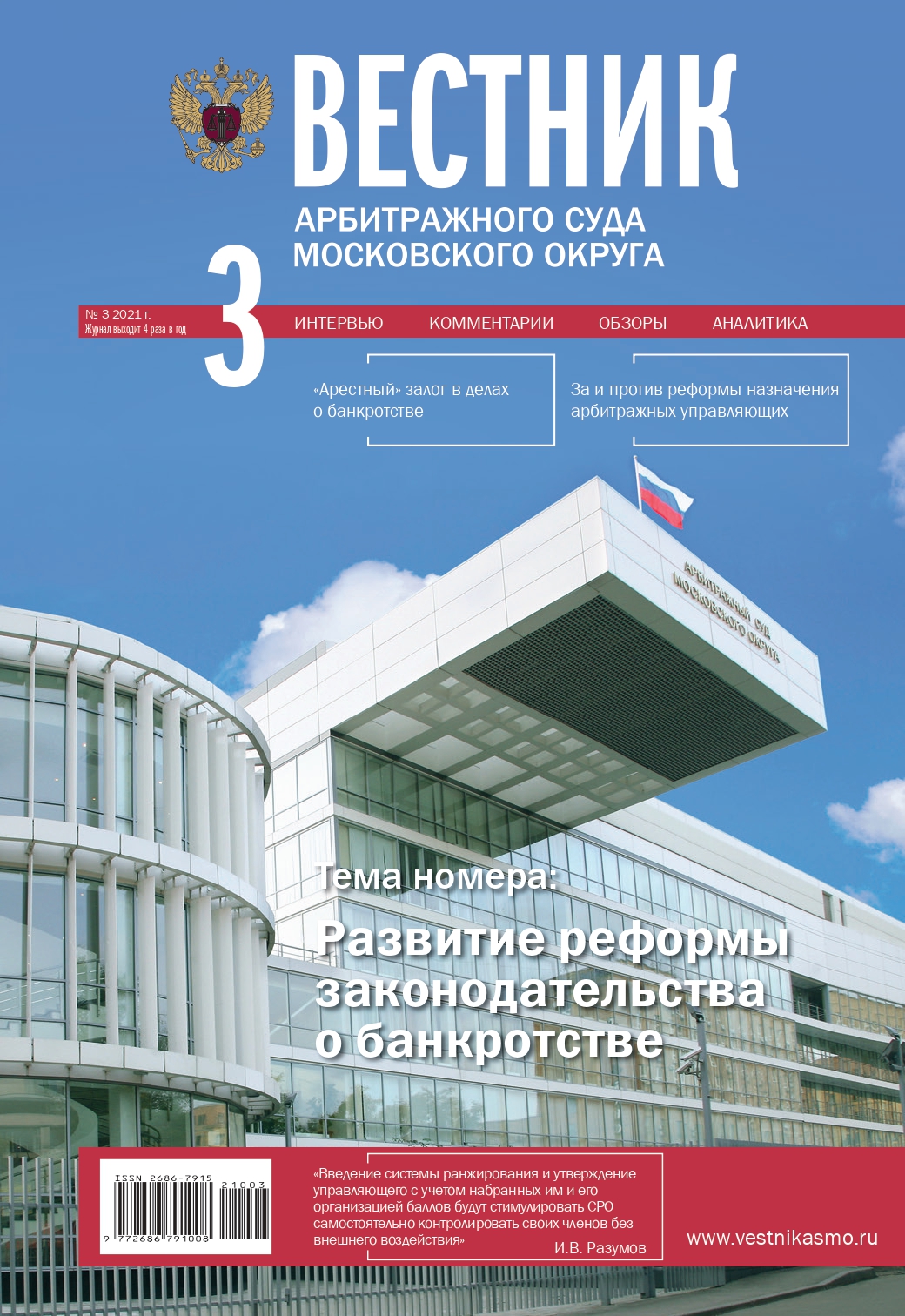Courts News
News of Moscow District Courts
Interview of the issue
I.V. Razumov. Ranking System and the Approval of the Insolvency Officer on the Basis of His and His Organisation’s Scores Will Encourage Self-Regulated Organisations to Monitor Their Members Themselves without Any External Influence
Topicality
Distributing the Proceeds from the Sale of the Object of Pledge between the Main Creditor-Pledger and the Executing Guarantor
Analytics: Development of Bankruptcy Law Reform
A.V. Kukin, O.P. Pleshanova
“Pledge by Arrest” in Bankruptcy Cases
The article deals with the problem of granting the creditors whose claims are secured by coercive measures against the debtor’s property the status of lien creditors in bankruptcy cases. The draft amendments to the Law on Bankruptcy envisage the occurrence of “pledge by arrest of property” or other security measures taken not only in respect of civil, but also tax and other claims. Under certain conditions, claims secured by a “pledge by arrest” may obtain priority over claims secured by other types of pledge. The authors see a worrying trend that the number of types of pledge and their equivalents is increasing, and that pledge itself is increasingly moving beyond the boundaries of private law. This creates the risk of intractable conflicts between different types of pledge and reduces the value of this method of securing obligations.
Keywords: Bankruptcy Law, “pledge by arrest”, lien creditor, tax authority, arrest of taxpayer’s property, subordination of creditors’ claims in bankruptcy cases
DOI: 10.46279/ASMO.2021.32.28.001
P.A. Kislovskiy, V.E. Kotkova
Pros and Cons of the Reform of the Appointment of Insolvency Officers
The purpose of this article is to examine the concept of selection and approval of insolvency officers proposed by the RF Ministry of Economic Development as part of the reform of bankruptcy legislation. For comparative study, the authors describe the procedure of appointing officers in Germany, England, France and the USA. A practical analysis of the concept proposed in the draft law is also provided with selected examples. The draft law is subject to conceptual criticism in two main aspects: (1) the choice of criteria for determining the performance of an insolvency officer (e.g., is it possible to develop an objective and fair system for evaluating insolvency officers?); (2) the minimisation of creditors’ participation in the approval of an insolvency officer (e.g., is the complete exclusion of creditors from the selection and approval procedures, ignoring their interest in choosing an officer justified?).
Keywords: insolvency (bankruptcy), Ministry of Economic Development bill, selection and approval of insolvency officer, approval of insolvency officer in Germany, England, France and USA, insolvency officer and SRO scores, register
DOI: 10.46279/ASMO.2021.29.42.002
E.D. Suvorov
A Bankruptcy Corporation: On the Potential Legal Personality of the Bankruptcy Estate
The article substantiates the possibility of recognition the bankruptcy estate as an insolvent corporation having legal personality. It is noted that this recognition will allow to solve the well-known problems of bankruptcy law, which are: the status and order of election of an insolvency officer; the nature of management powers by the creditors’ meeting and the status of community of creditors; the nature of current liabilities; the grounds of power of attorney over the bankrupt estate passed from the debtor to the officer appointed on the presentation of creditors; the problem of minority creditors and protecting their interests from the abuse of majority creditors; the ways of protection of their interests by the majority creditors. The structure of the corporation concerned, the rights of its members (ordinary, preferred and subordinated creditors, the debtor) are defined.
Keywords: legal personality, bankruptcy estate, bankruptcy corporation, principle of equality of creditors, bankruptcy administration, legal entity, corporate law
DOI: 10.46279/ASMO.2021.97.29.003
P.M. Morkhat
The Drawbacks of Literal and the Need for Systemic and Teleological Interpretation of Certain Provisions of the Law on Bankruptcy (A Commentary to the Ruling of the Judicial Panel for Economic Disputes of the Supreme Court of the Russian Federation of 08.04.2021 No. 305-ES20-2287)
The author examines the approaches to the interpretation of the provisions of the legislation on insolvency. Having analysed the dispute considered by the Supreme Court of the Russian Federation on the distributing the proceeds from the sale of the pledged property of the bankrupt, the author discovers both drawbacks of literal interpretation of the provisions of Article 138(6) of the Law on Bankruptcy and the need for their systemic, as well as teleological interpretation. It is concluded that literal interpretation would lead to a preferential right of pledge creditors to other creditors, because the costs directly related to the pledged property (e.g., current obligations to pay property taxes) will be repaid from the assets of the debtor to the detriment of the interests of unsecured loans, which would be unfair to the latter. Attention is drawn to the fact that a systemic and teleological interpretation of Article 138 (6) of the Law does not prejudice the rights of a pledged creditor, because it encourages him to sell the pledged property as soon as possible. The fate of pledged property, taking into account the principle of separateness of the procedure of realization of such property, depends on the will of pledge creditor who has the right to accelerate the decision concerning the realization of pledged property and to prevent the accumulation of debt obligations on current property taxes according to the Law on Bankruptcy.
Keywords: insolvency (bankruptcy), special legal regulation, pledge property, pledge creditor, creditor’s claims, literal interpretation, current payments, bankruptcy estate, systemic interpretation, teleological interpretation
DOI: 10.46279/ASMO.2021.64.16.004
V.P. Sorokin
Increased Standard of Proof Applied by the Arbitrazh Court to the Arbitral Award in Insolvency (Bankruptcy) Proceedings
The article deals with the topical problem of evaluation by the arbitrazh (commercial) court in insolvency (bankruptcy) cases of facts and circumstances established by the arbitral tribunal. The author assesses if a commercial court may consider the arbitration award according to the raised standard of proving. It is stated that the notion of a higher standard of proof in respect of arbitral decisions is not legally stipulated and there is no correlation between the application of this notion and the practice of higher courts. The problems of regulating the raised standard of proof in bankruptcy cases are disclosed. The necessity of fixing in law the concept of “higher standard of proof” is emphasized.
Keywords: arbitration award, higher standard of proof, basic principles of arbitration proceedings, evidence based on arbitration awards, issue of the legal effect of arbitration awards, legislative fixing of the concept of “higher standard of proof”
DOI: 10.46279/ASMO.2021.75.34.005
V.Z. Uddina
Foreclosure of a Citizen’s Only Housing in Insolvency (Bankruptcy) Proceedings
This article deals with the issues connected with the enforcement of recovery against the only accommodation of the debtor in the case of insolvency (bankruptcy) of a citizen. The author investigates the current regulations in the context of goals and tasks, searching for a balance of interests of creditors, bankruptcy trustee and the debtor.
Keywords: debtor’s sole residence, executive immunity, insolvency, bankruptcy
DOI: 10.46279/ASMO.2021.98.67.006
A.V. Solodilov
Legal Relations under Modern Russian Competition Law: Some Theoretical Aspects (Part 2)
The article deals with the theoretical issues of substantive and procedural legal relations in tenders. In the second part of the publication the author emphasizes the importance of organizational legal relations in bankruptcy as a connecting link between the substantive and procedural components of this sphere.
Keywords: insolvency (bankruptcy), legal relations, competition law, competitive process, substantive, procedural, organizational legal relations, the system
DOI: 10.46279/ASMO.2021.44.71.007
Analytics: Open Tribune
I.Ye. Gladkov
On Some Measures to Reduce the Judicial Workload as a Crucial Condition for Improving the Quality of Economic Justice
The article examines the current problem associated with the negative trend of increasing the workload of judges. On the basis of statistical data the author shows the uneven distribution of judicial work among the arbitrazh (commercial) courts of appeal. Also are described the approximate ways of the decision of the given problem which do not suppose large financial expenses and which demand legislative regulation.
Keywords: commercial court of appeal, judicial workload, pre-trial procedures, state fee
DOI: 10.46279/ASMO.2021.12.40.008
Scientific Advisory Council
Minutes of the Meeting of the Scientific Advisory Council of the Commercial Court of the Moscow District No. 21 held by means of a web conference
Protocol decision of the Presidium of the Commercial Court of the Moscow District No. 23


